
HISTORY AND PHILOSOPHY OF THE LIFE SCIENCES
Scope & Guideline
Advancing Understanding Through Historical and Philosophical Insights
Introduction
Aims and Scopes
- Historical Analysis of Biological Concepts:
The journal critically examines the historical development of key biological concepts, theories, and practices, including their socio-cultural impacts and implications. - Philosophical Inquiry into Life Sciences:
It engages with philosophical questions related to biology, such as the nature of life, evolution, and the ethical dimensions of biomedicine and research. - Interdisciplinary Approaches:
The journal promotes interdisciplinary scholarship, integrating insights from history, philosophy, sociology, and biology to enrich understanding of the life sciences. - Critical Examination of Scientific Practices:
It scrutinizes the methodologies and practices within the life sciences, including the implications of technology, experimental designs, and the role of values in scientific inquiry. - Exploration of Contemporary Issues:
The journal addresses contemporary issues within the life sciences, such as public health, environmental concerns, and the societal implications of genetic research.
Trending and Emerging
- Interdisciplinary Approaches to Health:
Recent publications highlight the integration of health sciences with history and philosophy, reflecting an increasing interest in how these fields inform public health policies and practices. - Ethical and Societal Implications of Biotechnology:
There is a surge in discussions surrounding the ethical implications of biotechnological advancements, particularly in areas such as genetic engineering, cloning, and synthetic biology. - Cultural and Political Dimensions of Science:
Emerging themes focus on the cultural and political contexts of scientific research, including how societal values shape scientific inquiry and public trust in science. - Evolutionary Theory and Its Contemporary Relevance:
A growing trend towards exploring the implications of evolutionary theory on contemporary issues, such as conservation, health, and social behavior. - Historical Perspectives on Emerging Diseases:
The COVID-19 pandemic has spurred interest in historical perspectives on emerging diseases, emphasizing the importance of historical context in understanding current health crises.
Declining or Waning
- Reductionist Perspectives on Biology:
There is a noticeable decrease in focus on strictly reductionist approaches to biology, as the field increasingly embraces complexity and systems thinking. - Historical Biographical Studies of Scientists:
There has been a waning interest in biographical studies of individual scientists, indicating a shift towards broader thematic explorations rather than singular narratives. - Classical Genetic Theories:
The once prevalent discussions surrounding classical genetic theories and Mendelian genetics are becoming less frequent, as attention shifts to genomics and epigenetics. - Philosophical Debates on Essentialism:
Discussions centered on essentialist views of species and traits are diminishing, possibly due to a growing recognition of the fluidity and complexity of biological categories. - Focus on Historical Case Studies:
The journal seems to be moving away from detailed historical case studies towards more thematic and theoretical analyses, potentially limiting the exploration of unique historical contexts.
Similar Journals
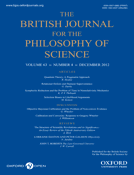
BRITISH JOURNAL FOR THE PHILOSOPHY OF SCIENCE
Shaping the Future of Scientific PhilosophyThe British Journal for the Philosophy of Science, published by University of Chicago Press, stands as a leading journal in the fields of philosophy and history of science. With its ISSN 0007-0882 and E-ISSN 1464-3537, this esteemed publication has been pivotal in advancing philosophical discussions surrounding scientific practice since its inception in 1950. Covering a diverse range of topics and critical analyses, it holds an impressive track record within the academic community, consistently achieving Q1 rankings across several categories, including History, Philosophy, and History and Philosophy of Science. With a Scopus rank placing it in the top percentiles of its respective fields, the journal is recognized not only for its academic rigor but also for its role in shaping contemporary philosophical discourse. While it is not an open-access journal, the British Journal for the Philosophy of Science provides essential insights and fosters critical thinking, making it an indispensable resource for researchers, professionals, and students dedicated to the nuanced interplay between science and philosophy.
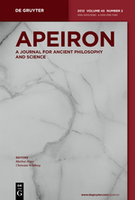
Apeiron-A Journal for Ancient Philosophy and Science
Illuminating Ancient Wisdom for Modern MindsApeiron - A Journal for Ancient Philosophy and Science is a distinguished academic journal published by Walter de Gruyter GmbH, based in Berlin, Germany. As an essential platform for scholars in the fields of History and Philosophy of Science and Philosophy, this journal holds a prestigious Q1 ranking in both domains as of 2023, reflecting its significant impact and contribution to these disciplines. With its ISSN 0003-6390 and E-ISSN 2156-7093, Apeiron aims to foster interdisciplinary dialogue by publishing original research, reviews, and critical essays that explore the rich intersections of ancient thought and scientific inquiry. As the journal converges into its fifth year from 2019 to 2024, it offers a vital resource for researchers, professionals, and students seeking to deepen their understanding of classical philosophical traditions and their relevance to contemporary science. Although it operates under a subscription model, the rigorous peer-review process ensures that each publication maintains the highest academic standards, thus solidifying Apeiron's status as a pivotal resource in its field.
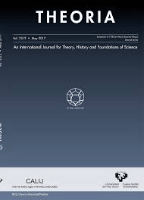
THEORIA-REVISTA DE TEORIA HISTORIA Y FUNDAMENTOS DE LA CIENCIA
Fostering Global Conversations on Scientific HeritageTHEORIA-REVISTA DE TEORIA HISTORIA Y FUNDAMENTOS DE LA CIENCIA, published by the Servicio Editorial Universidad del País Vasco, is a leading open access journal dedicated to advancing the fields of History, Philosophy of Science, and related disciplines since its inception in 2003. With a robust impact factor placing it in the esteemed Q1 and Q2 quartiles in its respective categories, this journal serves as a crucial platform for researchers, professionals, and students who are engaged in profound discussions and analyses of scientific foundations and historical contexts. Based in Spain, THEORIA has consistently demonstrated its commitment to scholarly excellence, achieving notable rankings in Scopus, particularly in the fields of Arts and Humanities, where it holds a rank of #169 in Philosophy and #59 in History and Philosophy of Science. The journal not only allows immediate open access to its diverse range of articles, fostering global knowledge dissemination, but also aims to bridge connections across varied philosophical inquiries and historical explorations within science. Join the dialogue today in shaping the future understanding of our scientific heritage.

Filosofiya-Philosophy
Advancing Philosophical Discourse GloballyWelcome to Filosofiya-Philosophy, an esteemed academic journal dedicated to advancing the field of philosophical inquiry. Published by NATSIONALNO IZDATELSTVO AZ BUKI, this journal aims to foster scholarly exchange and promote critical discussions on various philosophical themes and issues, including but not limited to metaphysics, ethics, logic, and epistemology. With its commitment to rigorous research and thought-provoking analyses, Filosofiya-Philosophy seeks to engage researchers, professionals, and students alike, enriching the discourse surrounding philosophical studies. Although currently not an open-access journal, it provides valuable insights that are crucial for the continuous exploration of philosophical ideas. Based in Sofia, Bulgaria, it plays a vital role in the dissemination of philosophical knowledge, inviting submissions from around the globe to enhance its academic community and further its impact in the realm of philosophy.

Journal for General Philosophy of Science
Connecting Ideas in the Philosophy of Science and BeyondJournal for General Philosophy of Science, published by Springer, stands as a pivotal resource in the fields of History and Philosophy of Science, as well as general Philosophy. With an impressive Q1 ranking in its categories and a solid reputation reflected in its Scopus rankings, this journal provides a robust platform for scholarly discourse and advancement in philosophical inquiry regarding science. The journal's commitment to quality is evident, catering to researchers, professionals, and students interested in the critical examination of scientific methods, theories, and their implications. While it operates on a subscription basis, the journal is dedicated to fostering a deeper understanding of philosophical issues surrounding scientific practices from 1980 through 2024. Operating out of the picturesque Netherlands, specifically from VAN GODEWIJCKSTRAAT 30, 3311 GZ DORDRECHT, the journal continues to encourage innovative thinking and interdisciplinary dialogue, underscoring its significance in academia today.
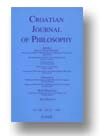
Croatian Journal of Philosophy
Engaging Minds, Expanding Philosophical HorizonsCroatian Journal of Philosophy is a distinguished academic platform dedicated to the advancement of philosophical discourse, published by KRUZAK D O O. With an ISSN of 1333-1108 and an E-ISSN of 1847-6139, this journal has been a key player in the field since its inception in 2008, continuing to progress through its converged years until 2024. Recognized for its scholarly contributions, it holds a prestigious placement in Q3 within the philosophy category for 2023 and ranks #571 out of 806 in Scopus, reflecting its engagement with a broad spectrum of scholarly discussions and ideas. Though it operates without an Open Access model, the journal remains a vital resource for researchers, professionals, and students who are keen to explore contemporary and traditional philosophical issues from diverse perspectives. The journal's commitment to expanding the boundaries of philosophical inquiry emphasizes the significance of interdisciplinary dialogue, making it a reputable choice for those seeking to deepen their understanding of philosophical thought.
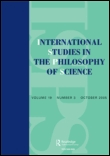
International Studies in the Philosophy of Science
Navigating the intricate relationship between science and philosophy.International Studies in the Philosophy of Science is a distinguished journal published by Routledge Journals, Taylor & Francis Ltd, dedicated to advancing scholarly dialogue in the intersecting realms of philosophy and science. With an ISSN of 0269-8595 and an E-ISSN of 1469-9281, this journal offers a carefully curated collection of research articles, reviews, and discussions that explore critical philosophical questions related to scientific methods, theories, and ethics. Although coverage for the journal in Scopus has been discontinued since 2017, it still maintains a respectable position with a rank of #75 out of 140 in the Arts and Humanities category, showcasing its relevance within the field. While it currently does not offer open access, the journal continues to be an essential resource for researchers, professionals, and students seeking to deepen their understanding of the philosophical underpinnings that inform scientific inquiry. By putting a spotlight on interdisciplinary approaches and fostering robust academic debate, International Studies in the Philosophy of Science plays a vital role in shaping the future discourse in the philosophy of science.
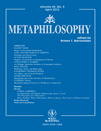
METAPHILOSOPHY
Unraveling the Complexities of Philosophical ThoughtMETAPHILOSOPHY is a prominent peer-reviewed journal published by Wiley that focuses on the intricate and evolving field of philosophy. Established in 1970, it provides a critical platform for scholars to explore the fundamental principles of philosophy, serving as a bridge between philosophical inquiry and broader intellectual discourse. With an impressive ranking in the Q2 category for Philosophy and a solid ranking of #223 out of 806 in the Scopus Arts and Humanities rankings, this journal is highly regarded for its contributions that adapt to contemporary philosophical challenges. Although it does not offer Open Access options, METAPHILOSOPHY is committed to disseminating rigorous research that engages with both classical and modern philosophical debates. As it converges into the year 2024, the journal continues to be an essential resource for researchers, professionals, and students dedicated to understanding and advancing philosophical thought.

Rhizomata-A Journal for Ancient Philosophy and Science
Bridging Ancient Wisdom and Modern ScienceRhizomata - A Journal for Ancient Philosophy and Science is a key academic publication dedicated to exploring the intricate intersections of ancient philosophical thought and scientific inquiry. Published by WALTER DE GRUYTER GMBH, this journal has established a significant presence in the field since its inception in 2013, with its convergence years extending to 2024. With a strong Q2 ranking in both the History and Philosophy of Science and Philosophy categories, it offers rigorous peer-reviewed articles that engage with the historical context and evolution of scientific ideas. The journal enjoys a commendable standing in Scopus rankings, positioned at 310 out of 806 in Philosophy, and 126 out of 223 in History and Philosophy of Science, showcasing its relevance and impact within these disciplines. While currently not an Open Access publication, the journal is instrumental for researchers, professionals, and students eager to delve into the foundational theories that have shaped modern scientific discourse. Join the dialogue and contribute to the vibrant academic community by engaging with Rhizomata, where ancient wisdom meets contemporary thought.

Cosmos and History-The Journal of Natural and Social Philosophy
Cultivating Interdisciplinary Connections in PhilosophyCosmos and History - The Journal of Natural and Social Philosophy is a pioneering academic journal dedicated to the exploration of philosophical questions within both the natural and social realms. Published by COSMOS PUBL COOPERATIVE in Australia, this Open Access journal has been committed to disseminating knowledge freely since 2005, allowing researchers and scholars from around the globe to access cutting-edge philosophical discourse. With an impressive status, it ranks in the Q2 category for Philosophy in 2023, and holds a commendable position at rank #399 out of 806 in the Arts and Humanities - Philosophy category on Scopus, placing it within the 50th percentile of its field. The journal covers a wide spectrum of topics, pushing the boundaries of interdisciplinary thought and fostering robust academic discussions that contribute to both theoretical and practical applications of philosophy. By addressing pressing contemporary issues, Cosmos and History serves as an invaluable resource for researchers, professionals, and students engaged in the nuanced interplay between philosophical ideas and societal developments, paving the way for future inquiries and innovations.